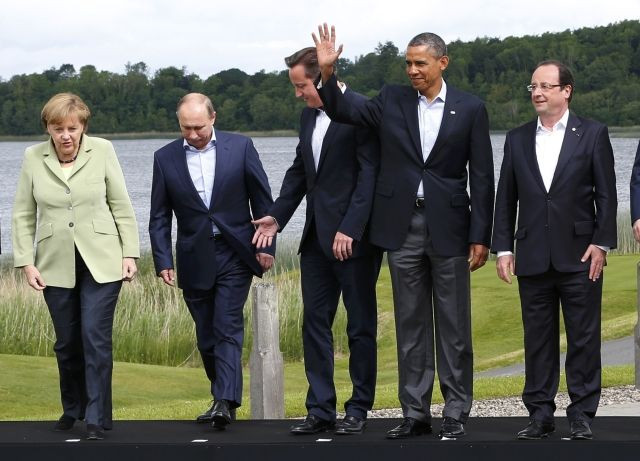G-8 Summit Highlights: Leaders Fail To Agree On Action Against Syrian Chemical Weapons Use; Consensus On Some Tax Evasion Measures

The two-day G-8 summit concluded on Tuesday in Northern Ireland with a lengthy official statement on global issues ranging from terrorism to tax evasion, but Russia's Vladimir Putin, a major supporter of Syrian President Bashar al-Assad, successfully resisted the inclusion of a statement condemning Assad, as the issue split the G-8 opinion.
Although the run-up to the summit saw Western nations, including the U.S., confirming that Assad’s forces used chemical weapons against civilians -- crossing President Barack Obama’s “red line” -- a joint statement issued by the G-8 leaders at the end of the summit did not accuse the Syrian government or the opposition of using chemical weapons and, instead, called for a U.N. investigation into reports of chemical warfare.
Other issues that were highlighted at the G-8 summit are:
Tax Evasion
The G-8 leaders agreed on strategies to prevent multinational corporations from indulging in pervasive tax evasion and supported a move to change the rules, which allow companies to shift their profits across borders to avoid taxes, and to make it mandatory for multinational entities to provide a detailed report on their tax burdens around the world.
“Companies should know who really owns them and tax collectors and law enforcers should be able to obtain this information easily,” G-8 leaders said in a declaration. “Developing countries should have the information and capacity to collect the taxes owed them – and other countries have a duty to help them.”
The G-8 welcomed an ongoing project undertaken by the Organization for Economic Cooperation and Development, or OECD, “in addressing Base Erosion and Profit Shifting by multinational enterprises" and stressed the need for "an ambitious and comprehensive action plan for the Finance Ministers and Central Bank Governors of the G20 in July.”
The leaders agreed to make collective efforts to tackle corruption, tax evasion and money laundering by misuse of shell companies, without mentioning the exact nature of efforts, although UK Prime Minister David Cameron, who chaired the summit, has been actively promoting adoption of measures to crack down on anonymous shell companies.
The Guardian said progress was “virtually non-existent” at the summit on the issue of tax evasion, adding that the joint declaration was a “windy document that committed the west's leading industrial nations to do little specific.”
Kidnapping By Terrorists
The summit concluded that tens of millions of dollars in payments as ransom to militant organizations, including al Qaeda, have helped fuel instability by sustaining their operations, and rejected the payment of ransoms to terrorists to secure the safe release of hostages. But, the joint statement did not mention names of any state players that may have been paying ransom.
Protectionism And Trade
The leaders agreed that governments should resist protectionism and agree on new trade deals to boost jobs and growth, and called for cutting “wasteful bureaucracy at borders” to make movement of goods between developing nations easier and quicker.
Plundering Precious Metals and Stones From Conflict Zones
The statement said that minerals, including gold, diamonds and other precious stones should be sourced legitimately, and not plundered from conflict zones.
Extraction of Natural Resources
The G-8 said it will take action to raise standards of transparency in extracting the world's natural resources, and called for common standards under which companies and governments would be required to report on extractives payments.
Libya
The G-8 welcomed the progress made by the Libyan government under Prime Minister Ali Zeidan, following the ouster of slain dictator Moammar Gadhafi.
© Copyright IBTimes 2024. All rights reserved.





















